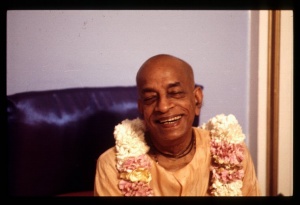SB 4.11.6: Difference between revisions
m (1 revision(s)) |
(Vanibot #0018 edit: make synonym terms in Sanskrit italic in SB - Vanisource) |
||
| Line 1: | Line 1: | ||
{{info | {{info | ||
|speaker=Maitreya | |speaker=Maitreya Ṛṣi | ||
|listener=Vidura | |listener=Vidura | ||
}} | }} | ||
[[Category:Srimad-Bhagavatam - Canto 04 Chapter 11|S06]] | |||
[[Category:Bhagavatam Verses Spoken by Maitreya Rsi - Vanisource|041106]] | |||
<div style="float:left">'''[[Srimad-Bhagavatam]] - [[SB 4|Fourth Canto]] - [[SB 4.11: Svayambhuva Manu Advises Dhruva Maharaja to Stop Fighting|Chapter 11: Svāyambhuva Manu Advises Dhruva Mahārāja to Stop Fighting]]'''</div> | |||
<div style="float:right">[[File:Go-previous.png|link=SB 4.11.5]] '''[[SB 4.11.5]] - [[SB 4.11.7]]''' [[File:Go-next.png|link=SB 4.11.7]]</div> | |||
{{RandomImage}} | |||
==== TEXT 6 ==== | ==== TEXT 6 ==== | ||
<div | <div class="verse"> | ||
tān hanyamānān abhivīkṣya guhyakān | :tān hanyamānān abhivīkṣya guhyakān | ||
anāgasaś citra-rathena bhūriśaḥ | :anāgasaś citra-rathena bhūriśaḥ | ||
auttānapādiṁ kṛpayā pitāmaho | :auttānapādiṁ kṛpayā pitāmaho | ||
manur jagādopagataḥ saharṣibhiḥ | :manur jagādopagataḥ saharṣibhiḥ | ||
</div> | </div> | ||
| Line 16: | Line 22: | ||
==== SYNONYMS ==== | ==== SYNONYMS ==== | ||
<div | <div class="synonyms"> | ||
''tān''—those Yakṣas; ''hanyamānān''—being killed; ''abhivīkṣya''—seeing; ''guhyakān''—the Yakṣas; ''anāgasaḥ''—offenseless; ''citra-rathena''—by Dhruva Mahārāja, who had a beautiful chariot; ''bhūriśaḥ''—greatly; ''auttānapādim''—unto the son of Uttānapāda; ''kṛpayā''—out of mercy; ''pitā-mahaḥ''—the grandfather; ''manuḥ''—Svāyambhuva Manu; ''jagāda''—gave instructions; ''upagataḥ''—approached; ''saha-ṛṣibhiḥ''—with great sages. | |||
</div> | </div> | ||
| Line 23: | Line 29: | ||
==== TRANSLATION ==== | ==== TRANSLATION ==== | ||
<div | <div class="translation"> | ||
When Svāyambhuva Manu saw that his grandson Dhruva Mahārāja was killing so many of the Yakṣas who were not actually offenders, out of his great compassion he approached Dhruva with great sages to give him good instruction. | When Svāyambhuva Manu saw that his grandson Dhruva Mahārāja was killing so many of the Yakṣas who were not actually offenders, out of his great compassion he approached Dhruva with great sages to give him good instruction. | ||
</div> | </div> | ||
| Line 30: | Line 36: | ||
==== PURPORT ==== | ==== PURPORT ==== | ||
<div | <div class="purport"> | ||
Dhruva Mahārāja attacked Alakāpurī, the city of the Yakṣas, because his brother was killed by one of them. Actually only one of the citizens, not all of them, was guilty of killing his brother, Uttama. Dhruva Mahārāja, of course, took a very serious step when his brother was killed by the Yakṣas. War was declared, and the fighting was going on. This sometimes happens in present days also—for one man's fault a whole state is sometimes attacked. This kind of wholesale attack is not approved by Manu, the father and lawgiver of the human race. He therefore wanted to stop his grandson Dhruva from continuing to kill the Yakṣa citizens who were not offenders. | Dhruva Mahārāja attacked Alakāpurī, the city of the Yakṣas, because his brother was killed by one of them. Actually only one of the citizens, not all of them, was guilty of killing his brother, Uttama. Dhruva Mahārāja, of course, took a very serious step when his brother was killed by the Yakṣas. War was declared, and the fighting was going on. This sometimes happens in present days also—for one man's fault a whole state is sometimes attacked. This kind of wholesale attack is not approved by Manu, the father and lawgiver of the human race. He therefore wanted to stop his grandson Dhruva from continuing to kill the Yakṣa citizens who were not offenders. | ||
</div> | </div> | ||
__NOTOC__ | |||
<div style="float:right; clear:both;">[[File:Go-previous.png|link=SB 4.11.5]] '''[[SB 4.11.5]] - [[SB 4.11.7]]''' [[File:Go-next.png|link=SB 4.11.7]]</div> | |||
__NOTOC__ | |||
__NOEDITSECTION__ | |||
Revision as of 21:45, 30 November 2017

A.C. Bhaktivedanta Swami Prabhupada
TEXT 6
- tān hanyamānān abhivīkṣya guhyakān
- anāgasaś citra-rathena bhūriśaḥ
- auttānapādiṁ kṛpayā pitāmaho
- manur jagādopagataḥ saharṣibhiḥ
SYNONYMS
tān—those Yakṣas; hanyamānān—being killed; abhivīkṣya—seeing; guhyakān—the Yakṣas; anāgasaḥ—offenseless; citra-rathena—by Dhruva Mahārāja, who had a beautiful chariot; bhūriśaḥ—greatly; auttānapādim—unto the son of Uttānapāda; kṛpayā—out of mercy; pitā-mahaḥ—the grandfather; manuḥ—Svāyambhuva Manu; jagāda—gave instructions; upagataḥ—approached; saha-ṛṣibhiḥ—with great sages.
TRANSLATION
When Svāyambhuva Manu saw that his grandson Dhruva Mahārāja was killing so many of the Yakṣas who were not actually offenders, out of his great compassion he approached Dhruva with great sages to give him good instruction.
PURPORT
Dhruva Mahārāja attacked Alakāpurī, the city of the Yakṣas, because his brother was killed by one of them. Actually only one of the citizens, not all of them, was guilty of killing his brother, Uttama. Dhruva Mahārāja, of course, took a very serious step when his brother was killed by the Yakṣas. War was declared, and the fighting was going on. This sometimes happens in present days also—for one man's fault a whole state is sometimes attacked. This kind of wholesale attack is not approved by Manu, the father and lawgiver of the human race. He therefore wanted to stop his grandson Dhruva from continuing to kill the Yakṣa citizens who were not offenders.